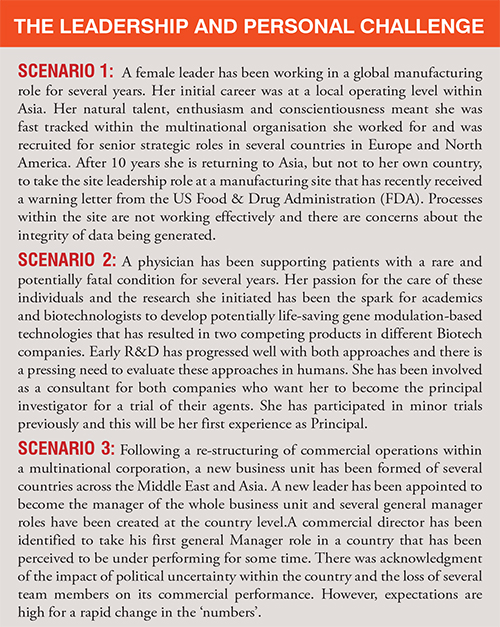The ability to adapt creates advantage. Agile processes are required to meet business goals. To facilitate this, Leaders need resources and skills to flex thinking and behaviours to match their current reality. This ‘mental capital’ is enabled through self-leadership: personal insights and ways to enhance relationships through 5key factors.
Leading in today’s culturally diverse workplaces with multidimensional processes and stakeholders requires individuals to adapt to new environments, learn new skills and manage a range of stresses and strains between the interface of professional and personal life.
Leaders may find themselves catapulted into new environments such as taking a senior role and having to move to a different country or culture. Alternatively, their career may develop more organically with time to assimilate roles and develop skills over a longer period of time. Either approach requires the individual to transition to a new role and situation effectively. In the world of performance management systems this no doubt means with no detriment to ’the numbers’ or the measures of success.
Mental capital is the sum total of all the resources we have available in any situation. These include inherent characteristics, such as our genetic personality traits and predispositions, and also the skills and experience we acquire through our lives to manage our life course and situation. The big five personality traits of conscientiousness, neuroticism, extraversion, agreeableness and openness to experience all impact our behaviours and therefore how we operate as leaders. In addition, the skills and abilities we have learnt through our lives support the development of core leadership competencies and the ability and degree of flexibility as leaders.
Psychological capital has been identified by Luthans and colleagues as being the ‘individuals positive psychological state of development’ with key measurable elements of confidence (self-efficacy), hope (motivation and adaptability of approaches), resilience (ability to grow from negative events ‘bounce back’) and optimism (the beliefs that you can positively impact events or the environment).
Our mental capital can also both increase and decrease depending on the situations we find ourselves in. As leaders it is therefore important to continually develop our mental capital to address the situations we encounter. To understand the complexities of maintaining and enhancing mental capital we have created some case studies from our own professional experience of leading business units and teams within the Biopharmaceutical Industry and supporting leaders make transitions in roles and expectations. We therefore offer 3 hypothetical situations to outline some key approaches needed by leaders to develop their mental resources to adapt to these situations.

These scenarios present a challenge to the leader in question. Each individual will need to adapt their personal and professional lives to meet the challenge that has been offered. Each role provides a significant opportunity for them to develop their careers and themselves, it is likely they are highly motivated to be successful in these moves and have support of the organisation to create change. They will be likely to have professional support from their respective multinational organisations. Two of the roles requires the individual to move to a different geographical location, one in which they may find the culture slightly different from what they have experienced previously. All roles have clear time pressures associated with success. In Scenario 1, to correct and introduce remediation of internal processes, in Scenario 2, to develop a safe clinical environment for evaluation of a new investigative product, and in Scenario 3, managing stakeholder expectations whilst creating a high performing commercial team. In all scenarios there would be an expectation to show progress within a matter of months.
In each of these time pressured roles, there is often a focus for individuals on what they need to do or achieve. Attention on ‘what needs to be done’ can potentially shrink the focus of the leader onto important tasks alone and creates a risk of them supervising the work of others, as opposed to creating an environment where people are aligned to common goals and are energised and engaged in activities that create them i.e. the ‘how’.
The ‘how’ is an essential question of leadership. It is about creating the right environment for people to work at their best. However, it is not about letting people do what they want as appropriate governance and process measures will need to be put in place for compliance issues. This is an important aspect for all the scenarios.
The first element for leaders in creating the ‘how’ is to develop their own mental capital. The Foresight project investigating how to develop mental capital and wellbeing through our life identified five core elements that maintain subjective wellbeing and performance. The five elements are:
These apply to all the individuals in these scenarios.
According to Neck and Houghton, self-leadership can be thought of as the ability to influence oneself to establish self-direction and self-motivation to perform from a perspective of intrinsic value. Developing mental capital can therefore enable leaders to acquire additional skills to adapt and perform effectively in whatever challenge is presented to them.

Taking time to be active is an important element of personal health. Not only does it enable leaders to ‘re-set’ by putting their attention to something that is not work-related, it also develops their fitness and resilience. Keeping active for periods of the day supports individuals to meet the challenge of leadership effectively. Taking time to go for a walk or taking the stairs instead of the lift can provide enough activity to allow the physiology to re-set and face workplace demands in a more resourced state.
Our attention can easily become narrowed when we focus on immediate tasks. This can result in us missing the bigger picture. Within each of the above scenarios there is a time sensitive pressure that all the leaders will experience. Developing the skills of taking notice or putting your attention to where you focus allows us to stay in the moment. Mindfulness guided meditation exercises can be useful to build this skill. However, mindfulness can also be practiced in an informal way, integrated into everyday life e.g. driving, walking and preparing for meetings.
This way, the leaders in our examples may be able to structure these activities into their day. Developing and engaging these skills in pressurised situations will enable leaders to use these skills when needed. Simple grounding and breathing exercises such as bringing your attention to your breath for one minute or using biofeedback (for example, HeartMath) can provide the space to clear your head and develop the skill of being more present and available in the moment. The awareness and ability to notice what you are feeling while maintaining a focus on your goals and an ability to flex develops leadership presence which enables improved individual and team performance. Developing these skills so that they become integrated mental resources will help to ensure that in pressurised situations, leaders will be able to draw on these skills and behaviours when needed.
Leaders need to keep learning to develop. Learning new activities and behaviours to stay active and keep in the moment provides a platform for life-long learning. However, the leaders in these scenarios also have immediate challenges to address.
In Scenario 1, learning about the new culture and existing processes will help her focus on the issues it is necessary to address. Gaining awareness of the need to train in regulatory requirements would also broaden the scope of what is necessary for her in this leadership role.
In Scenario 2, the leader not only needs to learn about her new responsibilities and accountabilities she also needs to develop her leadership style as a PI. Developing her soft skills in line with her new accountabilities as a leader, physician, researcher and study manager will be time well spent as she takes on the role of PI.
In Scenario 3, learning about each of the main brands in the portfolio will no-doubt be essential to focus activities of the team.
In all 3 scenarios the ability of the leader to learn about themselves and their knowledge gaps to focus their learning needs is a key aspect of mental capital development for leaders. Self-reflection is a really helpful way of doing this effectively. Transferring the discipline of continuous improvement reviews from ‘what’ has happened to ‘how’ we have led the team and managed the situation provides fuel for further growth and development. All leaders will need to develop trust within the team to enable a real focus on their resources and ways to negotiate or manage the barriers to obtaining their objectives. As leaders become more aware of their own patterns, beliefs and values it enables them to better relate to themselves and others. This is an important aspect of trust.
Leadership capital develops meaningful professional relationships at work. These relationships are important as they build the foundations of trust within the team and organisation. Balancing the complex interplay between personal and professional lives also is an essential element of leadership capital. Taking time to build in physical activities in the workplace also provides permission for others to do the same. Taking notice of the efforts of those around you provides an opportunity to build a positive relationship where both the leader and the team member create meaning and purpose from the interaction. This can be readily demonstrated as an alignment of goals and the development of that all-important trust in the team. It also provides an opportunity to assess if there is fundamental misalignment and differences in values or perspective between the organisational demands and team members.
In Scenario 1, this will be an important aspect of determining the motives behind any issues with compliance. The prospect of fraudulent or illegal actions of team members, for example, will require action to show that the consequences of such behaviour would not be tolerated.
Giving can often be seen as incompatible with the commercial environment. However, it is also part of an organisation’s social responsibility and an opportunity for them to “give back” to society. It is also an important aspect of leadership capital. However, it must be given with compassion and with no strings attached. The leader who gives time to others in the team can really support the close alignment of objectives. It can help others learn, it builds stronger teams especially when the focus is on the development of the team and the leader themselves. Being seen as someone who is continually developing and learning new skills and processes creates an environment where this becomes the norm. It is likely that this will not happen overnight, but a continued focus on the development of self and team will enable sustainable results.
Giving time for the development of others beyond the immediate objectives shows that the aims are long term and not just a single transaction. Human interactions are found to be more cooperative when it is clear there are multiple transactions over a long term and therefore an interest in the development of the team over the longer term provides benefits all round.
Developing mental capital allows leaders to adapt to the situations in which they find themselves. There is accountability to their teams, stakeholders and themselves to continually develop their resources to ensure sustainable and compliant performance and enhance wellbeing. The skills of self-leadership provide the ability to influence personal and professional development, to take the time to focus on the ‘how’ and to learn and grow are essential in our fast-paced and uncertain business environments. It is more than self-regulation or self-control, it is providing the internal motivation and ways of thinking to take the time to develop. In our experience of supporting and challenging individuals in this process, the benefits of self-leadership become manifest both professionally and personally.